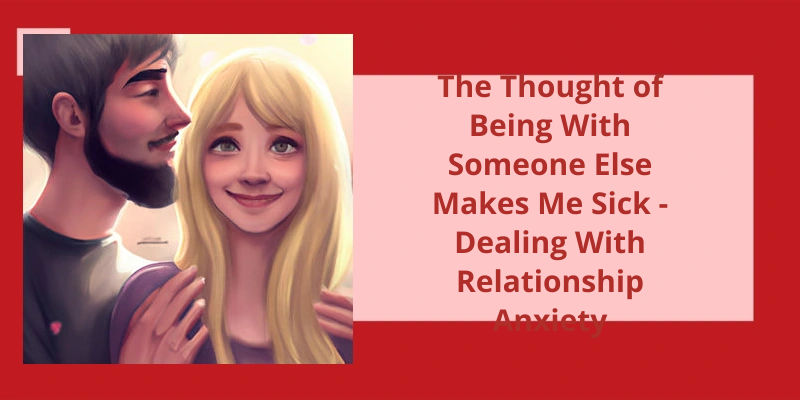As humans, we’re hardwired to seek connection with others, that much is certain. However, when that desire for connection is met with the thought of being with someone other than our current partner, it can create feelings of disgust and revulsion. The complexity of human relationships is vast, and the idea of infidelity can create a wide range of emotional responses. For some people, the very thought of being with someone else makes them physically ill. This can be an incredibly difficult experience to navigate, as the fear of being alone or losing one's partner can often lead to feelings of confusion and anxiety. For those who experience these intense feelings, the struggle to come to terms with them can be consuming, and finding a way to move forward can be a difficult journey. Nonetheless, it’s important to recognize and address these feelings, as ignoring them can potentially lead to unhealthy coping mechanisms or even a breakdown in the relationship.
Why Do I Feel Physically Sick When I Like Someone?
There are several possible reasons why you may feel physically sick when you like someone. One explanation is that the rush of emotions and hormones associated with falling in love can trigger the release of stress hormones like cortisol. When cortisol is released, it causes the blood vessels in your stomach to contract, which can result in nausea, butterflies, and even vomiting. So, if you feel like you’ve a knot in your stomach when youre around someone you like, it could be a sign that your body is responding to the stress of the situation.
Fear of rejection is a common source of anxiety and stress, and it can cause some physical symptoms, such as sweating, trembling, and feeling sick. This is because your body is preparing for a fight or flight response when you feel threatened, and it perceives rejection as a threat to your emotional well-being. So, when youre around someone you like, you may be subconsciously worried that they won’t reciprocate your feelings or that youll embarrass yourself, which can trigger the physical symptoms of anxiety.
In fact, it could be a sign that youre really into that person and that your body is responding to the excitement and anticipation of being close to them. This is why people often describe the feeling of falling in love as a “rollercoaster” of emotions, because it can be both exhilarating and terrifying at the same time.
However, if your physical symptoms are significantly affecting your daily life, or if youre experiencing other signs of anxiety or depression, it might be worth speaking to a healthcare professional. They can help you understand your feelings and provide you with resources and support to manage any symptoms or concerns you may have.
It’s important to recognize and address the root cause of these unpleasant physical sensations when thinking of an ex-partner. While it may be difficult, seeking professional support and guidance can be a helpful step towards healing and moving forward.
Why Do I Feel Sick to My Stomach When I Think of My Ex?
The reason you may feel sick to your stomach when thinking of your ex is due to the strong emotional attachment you may have had with them. The feelings of love, anger, and resentment that come with a break-up can have a profound impact on your well-being.
It’s important to recognize that these physical responses are a normal part of healing from a break-up. It’s natural to feel sad, angry, and anxious after a relationship ends, and these emotions can manifest in physical symptoms like nausea, headaches, and stomachaches. However, if these symptoms persist for an extended period of time, it could be a sign that you’re struggling to process your emotions and may benefit from seeking professional help.
One of the most important steps in healing from a break-up is to confront your feelings head-on. This may be difficult, but it’s the only way to move forward and let go of the pain associated with the relationship. A therapist can help you work through your emotions and develop healthy coping mechanisms so that you can begin to feel better.
You may also want to try some self-care techniques to help manage your physical symptoms. This could include practicing deep breathing exercises, going for a walk in nature, or engaging in a relaxing activity like yoga or meditation. Additionally, surrounding yourself with supportive friends and family can provide much-needed emotional support during this difficult time.
With time, you’ll begin to feel better and the physical symptoms associated with your ex will fade away. It’s important to keep in mind that a healthy, happy relationship is possible in your future, and that by processing your emotions and moving forward, you’re better positioning yourself to find the love that you deserve.
Empathy is a powerful emotion that can be both beneficial and detrimental to our well-being. While it allows us to understand and connect with others on a deeper level, it can also cause us to experience physical symptoms when someone we care about is suffering. This phenomenon is known as empathic distress, and it can be particularly challenging to deal with when it involves nausea and vomiting. However, with a better understanding of how empathy works, we can find ways to manage these feelings and support those around us when they need it most.
Why Do I Feel Ill When Someone Else Is?
Empathy is a natural and fundamental human emotion that allows us to understand and share the feelings of others in order to connect with them on an emotional level. It’s a powerful emotion that can help us build relationships and form deeper connections with the people in our lives. However, when it comes to feeling ill when someone else is sick, empathy can have some negative effects.
When we witness someone else being sick, our brains automatically react by creating a connection between what we see and what we feel. This connection triggers a series of physiological responses in our bodies, one of which is the feeling of nausea. This is why we often feel sick ourselves when we see or hear about someone else being sick, whether it’s on screen or in real life.
In addition to the connection between what we see and what we feel, we also have what’s called a mirror neuron system in our brains. This system is responsible for helping us imitate and understand the actions and emotions of others.
There are a few ways that you can try to cope with feeling ill when someone else is sick around you. One of the most effective ways is to distract yourself by focusing on something else. This could be anything from reading a book to listening to music, or even going for a walk. Another option is to try to remind yourself that what you’re feeling is a natural response to the situation and that it will pass.
While love itself can’t actually give you a physical illness like the flu, it does have the power to affect your body in different ways. Hormonal changes that come with the ups and downs of a relationship may lead to various symptoms that can impact your overall well-being. Additionally, the emotional toll of lovesickness can indirectly contribute to physical health problems. Let’s take a closer look at how your body and mind can be affected by the highs and lows of love.
Can a Relationship Make You Feel Sick?
Being in a relationship can be a rollercoaster ride. The ups and downs can be exciting and emotionally fulfilling, but they can also take a toll on our physical health. Studies have shown that intense feelings of love and heartbreak can affect our bodys hormone levels, leading to physical symptoms such as headaches, nausea, and even heart palpitations. The stress hormone cortisol, which is associated with feelings of anxiety and tension, can wreak havoc on our immune system and put us at risk of long-term health problems.
Furthermore, being in a toxic or unhealthy relationship can have a significant impact on our overall well-being. Constant arguments, disagreements, and emotional abuse can lead to chronic stress, which in turn can cause a range of physical symptoms, including fatigue, insomnia, and muscle tension. Moreover, being in an unsupportive relationship can make us feel isolated and lonely, increasing the risk of depression and other mental health issues.
It’s essential to recognize the signs of a toxic or unhealthy relationship and seek help if needed. Talking to a trusted friend or family member, seeking counseling or therapy, or even ending the relationship altogether may be necessary to protect our physical and emotional health. Taking care of ourselves, both mentally and physically, is crucial when we’re in a relationship.
Lastly, love can also make us vulnerable to unhealthy habits. Studies have found that people in happy relationships are more likely to engage in unhealthy behaviors like overeating, smoking, and drinking. The theory is that being in a supportive and happy relationship reduces stress and creates a sense of security, leading us to let our guard down and indulge in unhealthy habits. However, this can lead to long-term health problems, so it’s important to maintain a healthy lifestyle even when were in love.
Being in a relationship can have a significant impact on our physical and emotional health. It’s essential to prioritize our physical and emotional well-being and seek help if needed to maintain a healthy relationship with ourselves and those around us.
The Effects of Physical Intimacy on Physical and Emotional Health.
- Increases physical fitness and stamina
- Boosts immune system
- Reduces stress and anxiety
- Improves cardiovascular health
- Enhances mood and overall well-being
- Strengthens emotional bond with partner
- Increases feelings of intimacy and connection
- Improves quality of sleep
- May reduce risk of depression
- Promotes relaxation and reduces muscle tension
Conclusion
In conclusion, the idea of being with someone else can elicit a range of emotions, from discomfort to nausea. It’s a testament to the importance of emotional connection and intimacy in relationships, and the pain that can come with the thought of losing that connection. It’s a reminder to prioritize communication and honesty in our relationships, and to never take for granted the love and connection we share with our partners. Ultimately, the fear of being with someone else should motivate us to work harder to build and maintain strong, healthy relationships based on trust, respect, and emotional safety.






